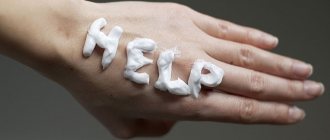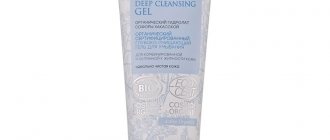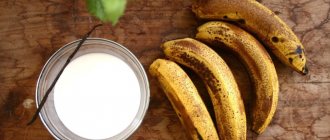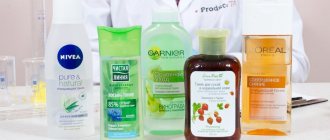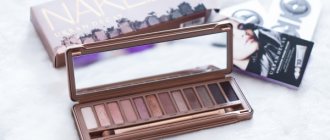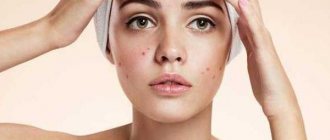Home » Reviews and testimonials » Multifunctional tools
Category: Multifunctional tools
It's a myth that people with problem skin shouldn't moisturize. Although it can be difficult to find a moisturizer that doesn't clog your pores, overall hydrated skin will have less breakouts. It is recommended to use a moisturizer twice daily to counteract the drying effects of acne treatments.
- Features of choosing a moisturizer for problem skin
- How to choose a moisturizer for problem skin
- How to choose the composition of a moisturizer for problem skin
- List of the best moisturizers for problem skin
- List of the best moisturizing mattifying creams for problem skin
- List of the best moisturizing creams-gels for problematic facial skin
Features of choosing a moisturizer for problem skin
You may have already guessed that those with acne-prone and sensitive skin should be most careful with the various ingredients in their skin care products. For all oily skin types, you're actually a winner here: Oily skin can handle a wider range of ingredients that can sometimes cause breakouts or irritation to other skin types.
For oily skin: Look for products containing alpha hydroxyl acids (glycolic acid or salicylic acid), benzoyl peroxide and hyaluronic acid. These ingredients are effective in controlling excess sebum production, while hyaluronic acid will only produce hydration in the areas needed.
For dry skin: Look for products that contain shea butter and lactic acid. These ingredients provide hydration and gentle exfoliation to leave dry skin looking radiant.
For sensitive skin: Look for products that contain aloe vera, oatmeal, and shea butter. These are good moisturizers and usually don't irritate the skin.
Packaging and popularity are sometimes easy traps that we fall into and should not have too much weight or value in what we choose for our skin. If you're going to buy a product based on a recommendation from a friend or influencer, you should not only pay attention to how good their skin looks now, but also what type of skin they've dealt with. This will give you a more reliable indicator of how well the product will work for you.
Checking the ingredient list is still the best way to choose a cream, no matter how many positive reviews or stars the product has online.
Unwanted Shine: Why Problems Occur
First, let's talk about skin that is excessively oily: pimples and blackheads constantly appear on it, it has a rough pattern, and is often rough to the touch. Why is this happening? The main reason is the active work of the sebaceous glands.
What caused it?
- Constitutional characteristics (for example, a tendency to diseases of the gastrointestinal tract).
- Hormonal imbalance (most often occurs during puberty and pregnancy).
- Nervous disorders that cause deterioration of the skin.
- Endocrine diseases (directly related to increased production of sex hormones or their deficiency).
- Improper diet (with a predominance of fatty and spicy foods, lack of vitamins).
- Improper care (use of inappropriate cosmetics or complete lack of hygiene and cosmetic procedures).
Lumpy, oily skin that is prone to acne occurs in both women and men. This problem makes itself felt especially often in adolescence. The exacerbation occurs in the summer.
How to choose a moisturizer for problem skin
The difference between ointments, creams and serums as hydration products can be significant. It is not recommended to use rich creams because they can leave the skin feeling oily. Instead, choose creams and lotions, but make sure they have healthy and non-comedogenic ingredients.
It's best to avoid fragrances altogether if possible, as many people with acne have different reactions to different scents.
Niacinamide is a type of vitamin B3 that is responsible for skin health.
Look for this ingredient when choosing a moisturizer.
Isopropyl myristate is a synthetic oil that is used as a binder and emollient (makes skin smooth) and a known comedogenic ingredient. This depends on the percentage of the ingredient contained in the product but unfortunately this information is not provided to consumers. A general rule of thumb is that the first six to seven ingredients in a moisturizer make up more than 90% of the product.
People with acne-prone skin should look for a non-comedogenic moisturizer with anti-inflammatory agents for two times a day to help hydrate the skin, help with scarring and soothe irritation.
Nourishing facial balm SVR Sensifine Nutri-Baume
Nourishing face balm SVR Sensifine Nutri-Baume The delicate texture of Sensifine Nutri-Baume balm makes you fall in love at first sight (read: application), after which attention is drawn to its caring properties. It soothes (panthenol came into play here), restores (squalane), nourishes and softens (shea butter) the skin, in a word - transforms. After it, it is impossible to stop and not touch your face, because it is silk.
How to choose the composition of a moisturizer for problem skin
Salicylic acid
Salicylic acid helps exfoliate dead cells from the skin's surface to treat acne while moisturizing.
Glycerin and hyaluronic acid
Hydrating property refers to the ability of a moisturizer to attract water from the dermis to the epidermis, increasing the water content and “hydration” of the epidermis. Glycerin and hyaluronic acid are great for drawing out moisture without causing acne. This cream does not leave the skin feeling heavy or greasy, making it ideal for people with oily or acne-prone skin.
Avoid petroleum jelly
The oil in moisturizers is classic Vaseline. Vaseline can have a greasy, heavy feel on the skin and is generally not preferred by patients with oily skin.
Instead, choose moisturizers labeled “oil-free.”
Dimethicone replaces petroleum jelly in most “oil-free” moisturizers and is preferred for acne patients.
Rosehip oil
Rosehip oil is pressed from the fruits and seeds of the rose plant, as opposed to rose oil, which comes from the petals. A substance high in vitamin C that can help increase collagen and aid in cell regeneration.
Avoid coconut oil
While coconut oil can be beneficial for some parts of the body, it is not great for acne-prone skin as it can clog pores and lead to breakouts. Coconut oil is less like pure vegetable oil and acts more like a wax on the skin, much like jojoba oil. It is highly comedogenic which means it cannot penetrate through the pores. Because of this, it sits on top of the skin, leading to clogged pores and causing extreme dryness.
Académie Programme Anti-Rougeurs
Program for removing redness Académie Programme Anti-Rougeurs Deep fine wrinkles, dryness, dullness, loss of tone, redness and microtraumas - this whole list of problems is dealt with in a short period by the program, or, better said, cream, Programme Anti-Rougeurs.
It contains a silicon derivative and extracts of linden, kudzu and horse chestnut, which reduce skin reactivity several times, protect against free radicals, strengthen capillaries and saturate with moisture. Text: Svetlana Antonova
List of the best moisturizers for problem skin
Moisturizing cream for problem skin MESALTERA by Dr. Mikhaylova
One common complaint among acne sufferers: a shiny, smooth complexion, especially after moisturizing. This oil-free, non-comedogenic moisturizer absorbs excess oil for a matte finish, keeping skin smooth and hydrated.
Moisturizing cream for problem skin Peter Thomas Roth Mega Rich
This ultra-silky gel-cream from Peter Thomas Roth is ideal for oily, acne-prone skin because it's lightweight, unscented (to reduce potential irritation), oil-free, and packed with hyaluronic acid and ceramides for much-needed moisture. Apply it at night as the last step in your skin care regimen for healthier skin in the morning.
Moisturizing cream for problem skin Noreva laboratories Exfoliac
This lightweight gel provides not only hydration, but also oil control, antioxidants and ceramides for healthier, clearer skin with every use.\
Moisturizing cream for problem skin ELIZAVECCA
The formula is infused with salicylic acid (a gentle exfoliator that unclogs your pores) and bamboo charcoal (a microfine powder that has antibacterial and antifungal properties) to simultaneously hydrate and heal your skin.
Moisturizing cream for problem skin Uriage Xemose Face Cream
This SPF moisturizer offers lightweight sun protection that won't clog your pores. The formula's blend of yellow bark and avocado extracts also helps keep your excess oil under control.
Mousse exfoliant against skin inflammation Dermalogica Clear Start FlashFoliant
Mousse exfoliant against skin inflammation Dermalogica Clear Start FlashFoliant The word “mousse exfoliant” can be misleading: usually such products need to be washed off with water, but not Clear Start FlashFoliant.
It really does a great job of unclogging pores, neutralizing blackheads, exfoliating, preventing the appearance of imperfections, evening out tone and adding radiance to the skin - and it does all this when it's on the face. That is, in essence, it is a multifunctional product for daily care of problem skin. Of course, all these effects are made possible thanks to a carefully thought-out composition that includes salicylic acid, beta hydroxy acid (BHA) from willow bark, as well as two extracts from tangerine peel and grapes. 3 secrets of perfect skin Margot Robbie Read
List of the best moisturizing mattifying creams for problem skin
Mattifying cream for problem skin Aveeno
This Aveeno moisturizer has ultra-soothing properties for the skin. The non-comedogenic, oil-free formula is enriched with oat extract to soothe and hydrate red, irritated skin—a common side effect of acne. It absorbs quickly so you don't have to deal with that sticky feeling or afternoon shine.
Mattifying cream for problem skin Onme
Named one of our best moisturizers with SPF, this two-in-one product contains zinc oxide and titanium dioxide to protect skin from sun damage and hyaluronic acid to hydrate and plump fine lines. The oil-free, fragrance-free formula is non-comedogenic and raves several dermatologists we spoke with about its natural shade and lightweight formula.
Mattifying cream for problem skin Cetaphil Dermacontrol
Cetaphil products will be classics. This non-greasy, non-comedogenic, fragrance-free lotion provides lightweight hydration for the most sensitive skin types, including acne, eczema, psoriasis and rosacea. Using glycerin, vitamin E and dimethicone, it leaves skin naturally soft and smooth.
Tweaking serum for face JBP Curacen Essence
Tweakment serum for face JBP Curacen Essence Translated from English, tweakments mean a light touch, a small correction, a non-obvious correction. That is, speaking in Russian, the Curacen Essence facial serum quickly eliminates any skin problems. To be more precise, this highly concentrated product with 11 amino acids improves the overall condition of the skin, restores tone, firmness and elasticity, moisturizes, evens out the complexion and has a powerful lifting effect. By the way, it can be applied to the skin before using a mesoscooter - the effect will be amazing.
List of the best moisturizing creams-gels for problematic facial skin
Moisturizing lotion for problem skin SPF 25 CeraVe
Thanks to its expert blend of ceramides (naturally occurring fats in the skin) and hyaluronic acid (a humectant), dry spots don't stand a chance—even on sensitive, acne-prone faces. Niacinamide, a form of vitamin B3, further strengthens the skin's protective barrier.
Neutrogena Hydro Boost moisturizing cream-gel for problematic skin
If you apply the moisturizer in the morning, it contains broad spectrum SPF 35 to protect against UV rays that darken the red marks associated with acne, as well as glycerin and dimethicone (an ingredient that reduces water loss without clogging pores) to seal in hydration . This moisturizer also settles into the skin without a chalky residue.
Life without water: dryness and tightness
It’s not just the excessive work of the sebaceous glands that worries many women. A lot of anxiety and discomfort arises due to dehydration of the surface layer of the epidermis. Loss of moisture leads to peeling, redness, and irritation. This problem is the opposite of the one discussed above, but no less relevant.
If oily skin shines, then dry skin looks dull, dead scales appear on it, it suffers from exposure to strong wind or sun, and wrinkles form on it earlier.
The causes of dehydration can be different - both external and internal:
- Genetic predisposition (people with blond hair and pale skin most often experience peeling and irritation).
- Disturbance in sleep patterns (if you don’t get enough rest, this affects the condition of the epidermis).
- Poor nutrition (lack of protein, vitamins B, A, C and E, polyunsaturated fatty acids, a lot of sweets, strong tea and coffee).
- Diseases of the liver and kidneys (in a person suffering from impaired functioning of the kidneys and liver, the elasticity of tissues is lost, the barrier and moisture-saving properties of the epidermis deteriorate).
Lack of proper care can also cause the condition to worsen.




